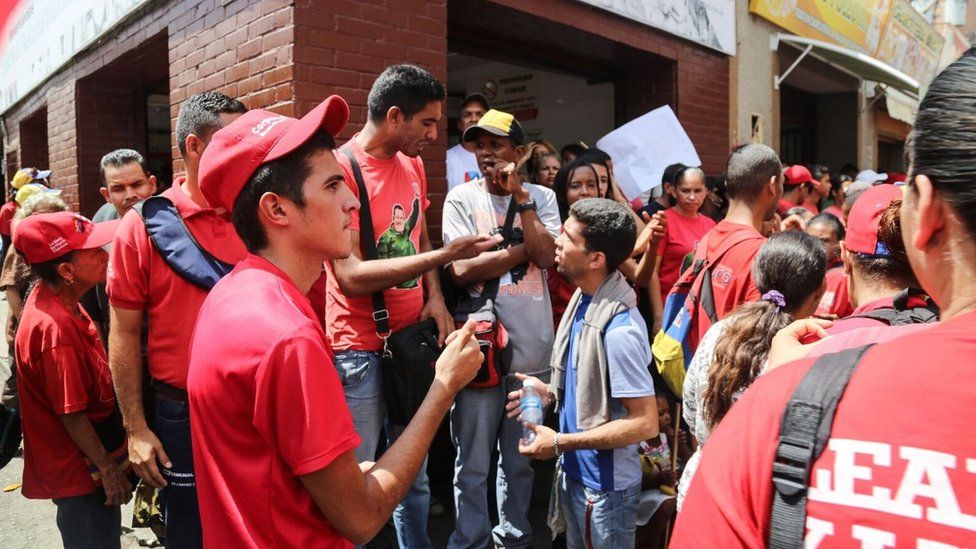Venezuela presidential election: Vote or veto?
- Published

You can tell you are approaching a campaign rally for President Nicolás Maduro by the number of buses on the roads which are bringing in supporters to fill the streets and cheer on the incumbent in Sunday's presidential election.
Attendance is further boosted by the free mangos the government is handing out to the hungry people who have turned up.
Venezuela is in crisis. There are severe shortages of food and medicines but you will not find people speaking badly about President Maduro at this rally.
More about Venezuela's crisis:
The message from those gathered here is clear: he is doing his best, against the odds.
Tommy Mujica, 26, says the president is the person best placed to solve Venezuela's problems. "Foreign powers, especially the US, need to stop meddling in Venezuelan affairs."
"When you have a problem at home, the parents resolve it," he says. "Nicolás Maduro is the father of our people, a president and we will keep working with him."
Many of those in the crowds wear T-shirts bearing the slogan: "Maduro: Together, everything is possible."
Divide and conquer
Unity is a big theme for President Maduro as he campaigns for a second term in office.
This time last year, Caracas was seeing nearly daily anti-government protests.
More about the 2017 street protests:
Now, the streets are quiet.
But the problems have not gone away. In fact, they have only got worse.
Annual inflation is at 14,000%. The minimum wage is less than $2 (£1.50) a month at the black market rate. The UN refugee agency estimates that 5,000 people are fleeing the country every day.
His approval ratings may have sunk to 20% and many Venezuelans have nothing good to say about their leader but President Maduro has cleverly outmanoeuvred the opposition with a "divide and conquer" strategy.
His rivals have struggled to second-guess his moves.
In October, opposition parties opted to participate in regional elections to prove they had the support of the people.
But after Mr Maduro's governing socialist party won a majority of governorships, the opposition cried foul and refused to participate in the mayoral elections two months later.
The opposition Democratic Unity coalition has decided to boycott Sunday's presidential elections, too, calling them a sham.
Add to that the fact that many opposition leaders have gone into exile, been banned from running or have been arrested and it starts to become clear why President Maduro's hand has been strengthened.
Traitor or political operator?
Henri Falcón is the man who thinks he can dislodge President Maduro from power.
He broke with the opposition to stand as a candidate and most polls put him in second place behind Mr Maduro.
He says that the only way out of "this terrible crisis" is through politics and elections.
Mr Falcón, a former governor of Lara state, argues that the Democratic Unity coalition only represents a fraction of the 80% of Venezuelans opposed to the government.
According to him, the majority of those 80% want to take part in the election.
Despair and abstention
But on the streets of the capital Caracas there does not seem to be much enthusiasm for the election. People say that they just want to live their lives, lives that get harder by the day.
An old man is picking through rubbish that has been dumped on the pavement, looking for something edible. Just five minutes earlier, another man had been urinating in the same place.
Even queuing for a bus has become a chore. With replacement parts hard to come by, many buses have gone out of service, leaving people waiting for hours to get on the bus home.
One of those I meet waiting in the queue is Veronica whose sleeping toddler is slumped over her shoulder.
"There's no transport, no food, insecurity, they're killing us every day," she says, adding that she definitely will not be voting on Sunday.
"I don't support anyone, nobody meets the expectations of the country, everyone is in it for their own benefit."
With people's faith in politics at a low point, abstention is predicted to be high and that in turn is believed to benefit President Maduro, who is widely expected to win the election.
Caracas-based political analyst Margarita López Maya says prospects are bleak if he does, especially as Venezuela risks being ostracised by countries such as Argentina, Canada, Colombia, France and the US among others, which argue that the government did not follow due process in the run-up to the vote.
"Maduro will proclaim himself as legitimate president but the international community has told him clearly that they will not recognise these elections because they are not democratic," she says.
"So not only will we have a president who will not be recognised by the international community but also a social and economic situation which is on the verge of shutting down the country."
For former mayor David Smolanksy who fled Venezuela last year, there is only one way forward and it is something he says many Venezuelans find hard to talk about.
"We need to persuade our armed forces to respect the rule of law," he says. "I'm not calling for a coup d'état but if they obey the laws and the constitution, if they guarantee the security and safety of all Venezuelans - instead of just the political parties - then Maduro is done."
- Published28 February 2018
- Published8 February 2018
- Published16 October 2017
- Published16 October 2017